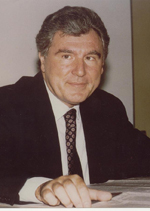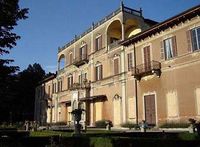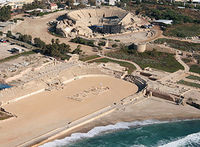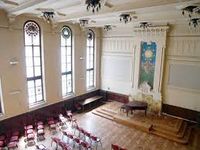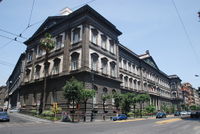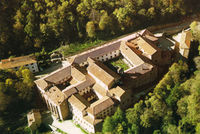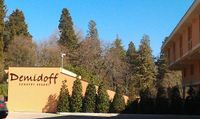Difference between revisions of "Nangeroni Meetings"
| (97 intermediate revisions by 4 users not shown) | |||
| Line 1: | Line 1: | ||
[[File:Alessandro Nangeroni.jpg|thumb|150px|Alessandro Nangeroni (1940-1999)]] | |||
[[File:Villa Cagnola.jpg|thumb|left|200px|1st & 4th Nangeroni Meetings, at Villa Cagnola, Gazzada, Milan, Italy (2012, 2015)]] | |||
[[File:Caesarea.jpg|thumb|200px|left|2nd Nangeroni Meeting, at Dor, near Caesarea Israel (2014)]] | |||
[[File:Boccaccini.jpg|thumb|150px|[[Gabriele Boccaccini]], founding director of the Nangeroni Meetings]] | |||
[[File:Facolta Valdese.jpg|thumb|left|200px|3rd & 7th Nangeroni Meetings, at the Waldensian Faculty of Theology, Rome, Italy (2014, 2016)]] | |||
[[File:2016 Boccaccini Segovia.jpg|thumb|150px|3rd Nangeroni Meeting proceedings (2016)]] | |||
[[File:University Naples.jpg|thumb|left|200px|5th Nangeroni Meeting, at Naples, Italy (2015)]] | |||
[[File:Monastero Camaldoli.jpg|thumb|left|200px|6th Nangeroni Meeting, at Camaldoli, Italy (2016)]] | |||
[[File:2016 Grabbe Boccaccini.jpg|thumb|150px|1st Nangeroni Meeting proceedings (2016)]] | |||
[[File:Demidoff Country Resort.jpg|thumb|left|200px|8th Nangeroni Meetings, at the Demidoff Country Resort, Pratolino, near Florence, Italy (2017)]] | |||
The '''Nangeroni Meetings''' (2012-) are a series of small-size international seminars promoted by the [[Enoch Seminar]], in collaboration with the [[Department of Near Eastern Studies]] of the [[University of Michigan]], the [[Alessandro Nangeroni International Endowment]] and the [[Michigan Center for Early Christian Studies]] | The '''Nangeroni Meetings''' (2012-) are a series of small-size international seminars promoted by the [[Enoch Seminar]], in collaboration with the [[Department of Near Eastern Studies]] of the [[University of Michigan]], the [[Alessandro Nangeroni International Endowment]] and the [[Michigan Center for Early Christian Studies]] | ||
< [[First Nangeroni Meeting|1st (Milan 2012)]] -- [[Second Nangeroni Meeting|2nd (Israel 2014)]] -- [[Third Nangeroni Meeting|3rd (Rome 2014)]] -- [[Fourth Nangeroni Meeting|4th (Milan 2015)]] -- [[Fifth Nangeroni Meeting|5th (Naples 2015)]] -- [[Sixth Nangeroni Meeting|6th (Camaldoli 2016)]] -- [[Seventh Nangeroni Meeting|7th (Rome 2016)]] -- [[Eighth Nangeroni Meeting|8th (Florence 2017)]] -- [[Ninth Nangeroni Meeting|9th (Milan 2018)]] -- [[Tenth Nangeroni Meeting|10th (Rome,2018)]] -- [[Eleventh Nangeroni Meeting|11th (Milan 2019)]], [[Twelfth Nangeroni Meeting|12th (Berlin 2020)]] > | |||
==Overview== | ==Overview== | ||
Thanks to the contribution of the Alessandro Nangeroni International Endowment, a series of seminars on Jewish, Christian and Muslim origins | Thanks to the contribution of the Alessandro Nangeroni International Endowment, a series of seminars on Jewish, Christian and Muslim origins was launched by the [[Enoch Seminar]], starting from the year 2012. | ||
==List of Nangeroni Meetings== | |||
* | *1. [[The Seleucid and Hasmonean Periods and the Apocalyptic Worldview / 1st Nangeroni Meeting (2012 Milan), conference]] | ||
* | *2. [[Voice of Jacob: Early Jewish Texts and Traditions in Christian Transmission / 2nd Nangeroni Meeting (2014 Dor), conference]] | ||
* | *3. [[Re-Reading Paul as a Second-Temple Jewish Author / 3rd Nangeroni Meeting (2014 Rome), conference]] | ||
* | *4. [[Early Islam: The Sectarian Milieu of Late Antiquity? / 4th Nangeroni Meeting (2015 Milan), conference]] | ||
*5. [[Second Temple Jewish Paideia in its Ancient Near Eastern and Hellenistic Contexts / 5th Nangeroni Meeting (2015 Naples), conference]] | |||
*6. [[John the Jew: Reading the Gospel of John’s Christology as a Form of Jewish Messianism / 6th Nangeroni Meeting (2016 Camaldoli), conference]] | |||
*7. [[The Early Reception of Paul the Jew / 7th Nangeroni Meeting (2016 Rome), conference]] | |||
* | *8. [[New Perspectives and Contexts in the Study of Islamic Origins / 8th Nangeroni Meeting (2017 Florence), conference]] | ||
* | *9. [[The Period of the Middle Maccabees: from the death of Judas through the reign of John Hyrcanus (ca. 160–104 BCE) / 9th Nangeroni Meeting (2018 Milan), conference]] | ||
* | *10. [[Gender and Second Temple Judaism / 10th Nangeroni Meeting (2018 Rome), conference]] | ||
*11. [[Eleventh Nangeroni Meeting (2019 Gazzada), conference|The Study of Islamic Origins / 11th Nangeroni Meeting (2019 Milan), conference]] | |||
*12. [[Twelfth Nangeroni Meeting (2021 Berlin), conference|Constructions of Gender in Late Antiquity / 12th Nangeroni Meeting (2021 Berlin), conference]] | |||
13. On Sibylline Oracles (Naples, 2021) | |||
14. Virtus and Humanitas: Virtues and Values in Greco-Roman, Jewish and Christian Paideia at the Turn of the Cpmmon Era. (May 29 - June 3, 2022). | |||
==Guidelines for Organizing a Nangeroni Meeting== | |||
The Nangeroni Meeting is meant to be a meeting of around 30 scholars (as compared to the Enoch Seminars which are designed to have 50-80 participants). It includes: | |||
* 6-7 major paper authors | |||
* | * 6-7 major paper respondents | ||
* 12-16 short paper authors | |||
* Up to 4 reading sessions chairs | |||
Organizing a Nangeroni Meeting is a 4-step process | |||
*First Step: An Enoch Seminar Member(s) proposes a topic, which then must be approved by the Enoch Seminar Board of Directors. | |||
* | **Timeframe: 2 years prior to date of proposed Nangeroni Meeting | ||
*Second Step: The appointed chair(s) of the Nangeroni Meeting should gather a group of at least 5-10 colleagues, who are committed to participate in the Meeting and collaborate on its organization. At this point, an email will be sent to the Enoch Seminar members, announcing the proposal and asking those who are particularly interested in the topic to join the organization of the Meeting. | |||
**Timeframe: 1.5 years prior to the date of the Nangeroni Meeting | |||
*Third Step: The appointed chair(s) must present the final schedule, including the major authors and paper topics to the Enoch Seminar Board of Directors for final approval. | |||
* | **Timeframe: 1 year prior to the date of the Nangeroni Meeting | ||
* | |||
* | *Fourth Step: The Enoch Seminar Board of Directors will announce and advertise the program and registration for the Nangeroni Meeting until the maximum number of participants (~35) is reached. | ||
**Timeframe: 8-6 months prior to the date of the Nangeroni Meeting | |||
==External links== | ==External links== | ||
Latest revision as of 07:40, 27 May 2020
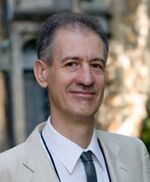
The Nangeroni Meetings (2012-) are a series of small-size international seminars promoted by the Enoch Seminar, in collaboration with the Department of Near Eastern Studies of the University of Michigan, the Alessandro Nangeroni International Endowment and the Michigan Center for Early Christian Studies
< 1st (Milan 2012) -- 2nd (Israel 2014) -- 3rd (Rome 2014) -- 4th (Milan 2015) -- 5th (Naples 2015) -- 6th (Camaldoli 2016) -- 7th (Rome 2016) -- 8th (Florence 2017) -- 9th (Milan 2018) -- 10th (Rome,2018) -- 11th (Milan 2019), 12th (Berlin 2020) >
Overview
Thanks to the contribution of the Alessandro Nangeroni International Endowment, a series of seminars on Jewish, Christian and Muslim origins was launched by the Enoch Seminar, starting from the year 2012.
List of Nangeroni Meetings
13. On Sibylline Oracles (Naples, 2021)
14. Virtus and Humanitas: Virtues and Values in Greco-Roman, Jewish and Christian Paideia at the Turn of the Cpmmon Era. (May 29 - June 3, 2022).
Guidelines for Organizing a Nangeroni Meeting
The Nangeroni Meeting is meant to be a meeting of around 30 scholars (as compared to the Enoch Seminars which are designed to have 50-80 participants). It includes:
- 6-7 major paper authors
- 6-7 major paper respondents
- 12-16 short paper authors
- Up to 4 reading sessions chairs
Organizing a Nangeroni Meeting is a 4-step process
- First Step: An Enoch Seminar Member(s) proposes a topic, which then must be approved by the Enoch Seminar Board of Directors.
- Timeframe: 2 years prior to date of proposed Nangeroni Meeting
- Second Step: The appointed chair(s) of the Nangeroni Meeting should gather a group of at least 5-10 colleagues, who are committed to participate in the Meeting and collaborate on its organization. At this point, an email will be sent to the Enoch Seminar members, announcing the proposal and asking those who are particularly interested in the topic to join the organization of the Meeting.
- Timeframe: 1.5 years prior to the date of the Nangeroni Meeting
- Third Step: The appointed chair(s) must present the final schedule, including the major authors and paper topics to the Enoch Seminar Board of Directors for final approval.
- Timeframe: 1 year prior to the date of the Nangeroni Meeting
- Fourth Step: The Enoch Seminar Board of Directors will announce and advertise the program and registration for the Nangeroni Meeting until the maximum number of participants (~35) is reached.
- Timeframe: 8-6 months prior to the date of the Nangeroni Meeting
